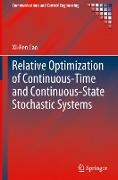- Start
- Relative Optimization of Continuous-Time and Continuous-State Stochastic Systems
Relative Optimization of Continuous-Time and Continuous-State Stochastic Systems
Angebote / Angebote:
This monograph applies the relative optimization approach to time nonhomogeneous continuous-time and continuous-state dynamic systems. The approach is intuitively clear and does not require deep knowledge of the mathematics of partial differential equations. The topics covered have the following distinguishing features: long-run average with no under-selectivity, non-smooth value functions with no viscosity solutions, diffusion processes with degenerate points, multi-class optimization with state classification, and optimization with no dynamic programming.The book begins with an introduction to relative optimization, including a comparison with the traditional approach of dynamic programming. The text then studies the Markov process, focusing on infinite-horizon optimization problems, and moves on to discuss optimal control of diffusion processes with semi-smooth value functions and degenerate points, and optimization of multi-dimensional diffusion processes. The book concludes with a brief overview of performance derivative-based optimization.Among the more important novel considerations presented are:the extension of the Hamilton-Jacobi-Bellman optimality condition from smooth to semi-smooth value functions by derivation of explicit optimality conditions at semi-smooth points and application of this result to degenerate and reflected processes, proof of semi-smoothness of the value function at degenerate points, attention to the under-selectivity issue for the long-run average and bias optimality, discussion of state classification for time nonhomogeneous continuous processes and multi-class optimization, anddevelopment of the multi-dimensional Tanaka formula for semi-smooth functions and application of this formula to stochastic control of multi-dimensional systems with degenerate points.The book will be of interest to researchers and students in the field of stochastic control and performance optimization alike.
Folgt in ca. 10 Arbeitstagen
